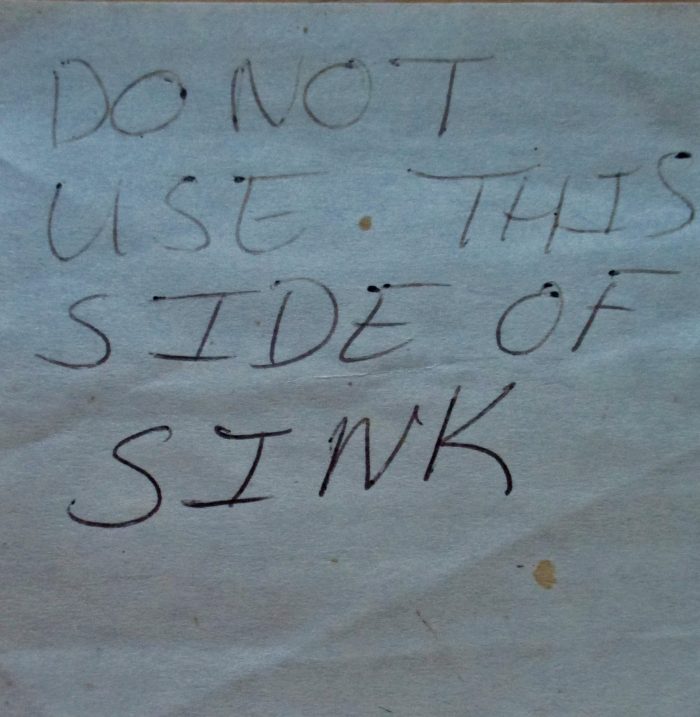A member of my family, grappling with hoarding behaviors, made herself a Post- It, which read, “Do Not Use This Side of the Sink.” She wanted to remind herself of what worked and what didn’t work in her home, as it was increasingly overrun by chaos.
As I looked at that little square of yellow paper, I visualized my own issues, springing from my background of abuse, anxiety and depression. As I gazed into the square, two phrases rose to the top of my understanding: “What IF?” and “Not Enough/Too Much.”
Those have been the root causes of much suffering. I’ve been in therapy, for years, addressing those causes. But it has only been within the last year, things were distilled so concisely under these two headings.
“What IF?” and “Not Enough/Too Much.”
These mandates cut to our sense of self. Are you and I safe? Are we okay? Are we enough of the good attributes or too much of the unwelcomed variety?
Most of us, I believe, struggle with these stifling theories. We struggle to feel we are “enough” in any given context. We struggle to be at peace with ourselves in the world.
Beauty/Appearance
A rejecting sense of self, from the start, was expressed through my disordered eating and image issues. It was mostly reduced to two words I heard uttered endlessly during my childhood: “Right Weight.”
For whatever reason, as that child, I was told I was not meeting that criteria. I was placed on my first diet at age seven to remedy the situation. I wrongly believed that if I just fit a certain image, a thin one at that, I would finally be acceptable. Childhood and adolescence, not surprisingly, were filled with crash diets and self-loathing. By eighteen, I was on my way to embodying Anorexia, and a low, two-digit weight and later, Bulimia, eventually gaining one hundred pounds more to my once skeletal frame in under one year’s time.
The “What IF?” and “Not Enough/Too Much” principles were in full effect as I was petrified of “being fat.” That was the worst thing that could befall me. “Being fat” would, indeed, bring much-deserved wrath, punishment and confirmation I was worthless. And I wanted to escape that horrible sentence. So, I created my own disordered prison to prevent it.
Only, it didn’t work. No matter where I was on the scale, no matter how emaciated, puffy and yes, “fat” I was, I was still hounded by “What IF?” and “Not Enough/Too Much.”
But I never answered that faulty thinking. I just lived in worst-case scenario possibility, never challenging the oppression with “You will still be valuable and good enough. That won’t change.”
“What IF?” and “Not Enough/Too Much” didn’t let me off the hook, cementing fear. Was that nature or nurture? It’s hard to say, even after years of therapy. It’s probably a combination of both. I, by nature, have an anxious temperament. That wasn’t helped by the dysfunction, the abuse and the chaos I was raised in. No matter what, I felt unsafe.
Lovability
And, again, going back to my toxic sense of self, much of that unsafe perspective traced back to my loveable status. I didn’t feel I was. Was my lovability in question because of something I did…or was it because of who I was?
Achievement
My misguided “solution” to that was to earn love. I believed if I could just change the actions “enough,” then I’d be okay. I would, somehow, earn my keep: awards, good grades, scholarships, a two-digit weight, mastery over my human body, control. I knew that unconditional love was out of the question. And so, trying. Striving. Achieving. Failing.
And that last one, the “Failing” option, only reiterated the sinking conclusion for me personally: I was defective. Something was inherently wrong with me.
And no amount of trying or achieving would or could change that.
Perfection
Still, I believed if I could just be “perfect,” that would be my reassuring salvation. After all, no one could argue with perfection. It, supposedly, defies argument because it is promises itself to be complete, aesthetically pleasing, meeting every need and desire. Yes, I was desperate enough to believe I could attain that.
And, throughout my recovery, this word, “perfection” is a watchword I need to approach with brutal honesty. Its vestiges still hang around. The voice, mouthing the tricky word, concurs, yet again with “What If?” and “Not Enough/Too Much.” They are triplets, or, at the very least, siblings, all vying for my demise in any way they can achieve it.
Perfection cannot only threaten to kill the body, via disordered behaviors of self-harm. It can also kill the psyche, the soul: the mind, the will and the emotions. That, one may argue, is a far more painful and destructive death.
Do Not Use This Side of the Sink
And then there was my cancer diagnosis.
Going back to that sticky yellow Post-It, I now viewed “What If?” and “Not Enough/Too Much” as “that side of the sink” I needed to avoid.
Cancer grabbed my attention. Now, these oppressive slave drivers could kill me. I had to confront them; they could no longer have free reign over my psyche.
“Use THIS Side of the Sink!”
Therefore, I had to counter the toxicity of both “What If?” and “Not Enough/Too Much” with responses that were better for the psyche: “What IS” and “Enough, Even While Imperfect.”
Beauty/Appearance
“What IS”
When I was fully in the grips of Anorexia, my worst fear was to gain weight. That included any fluid retention from drinking water. Anything that moved the scale, upping the pounds was a fate worse than death. Likewise, I viewed any food as the enemy that was going to end me, let alone, end my hopes and dreams to be some version of reinvented “thin/good enough.” I kept torturing myself with the “What IF?” question, paralyzing myself with endless worst-case scenarios that, by the way, never happened.
“Our greatest fears lie in anticipation.”
Honoré de Balzac
And so, I had to look at and embrace “What IS.”
That means the imperfect body. At various eras and stages of my life, that has meant different things. Most recently, that includes life after my bilateral mastectomy; I no longer have breasts. Some people may think of that reality as horrific and unacceptable. I don’t. It is my reality.
“Enough, Even While Imperfect.”
It took losing my breasts to “gain” a deeper self-acceptance. I am enough. No matter the body measurements, no matter the aesthetic standards, no matter the diagnosis, I am enough, even while being imperfect.
Lovability and Achievement
“What IS”
Now, I’m in a phase of my life where I am gradually accepting the anticipation of the interesting, while learning how to love and appreciate myself. Interesting things are imperfect. And an interesting life is, likewise, an imperfect life. The world still turns without perfection. It still turns.
One realization, indeed, can dovetail into another.
Lovability does not require performance-based, jumping through hoops. It should not require it, anyway.
However, the myth of achievement often tells us otherwise. We are as valuable as our appearance, bank account, social standing, relationship, and any other external thing.
But that’s a lie.
No matter what we do, how we look, how much money we make, what goal we realize, it does not change our inherent value. Lovability is part of that package.
I’ve embraced my faults, my failures, my real-life manifestations of imperfection, my drastic, changed body…and I’m still okay. In fact, I’m more than okay; again, I’m interesting. I’m human in all of humanity’s glory. That’s beautiful, wonderful, strong, delicate. It’s not predicated on doing, but on being.
Being is the “What IS” that has been there all along. We just need to recognize it as such. Different experiences and realizations create the space. But the space does exist.
“Enough, Even While Imperfect”
And again, it permits you and I to be loved and loveable, as imperfect as we currently are. My faith has thrown around an intimidating, Biblical word: Grace. But, yes, Grace is the Space. Grace doesn’t shy away from here and now, from ugly pain and truth, from imperfection. Grace is.
Apply as needed.
The fears, the failures, the rejections of who we are, whether self-imposed or from other people, all exist on one side of the sink, the nonworking side of the sink.
Shouldn’t we try something else now? Shouldn’t we try something else that will work?
Love? Acceptance? Dignity? Respect?
They all exist. They’re just found elsewhere from where we’re obsessively hunting. There are two sides of the sink.
Therefore, use side that works.
Copyright © 2019 by Sheryle Cruse












Read 0 comments and reply